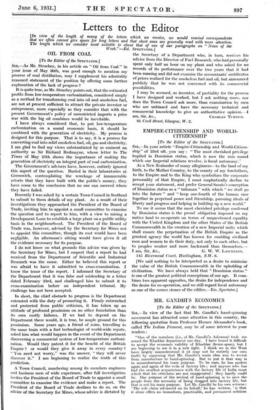Letters to the Editor
view of the length of many of the letters which we receive, we would remind correspondents we often cannot give space for long letters and that short ones are generally read with more attention. length which we consider most suitable is about that of one of our paragraphs on " News of the Week."—Ed. SPECTATOR.]
[In that The
OIL FROM COAL
[To the Editor of the SPECTATOR.] SIR,—As Mr. Strachey, in his article on " Oil from Coal" in your issue of May 30th, was good enough to mention my process of coal distillation, may I supplement his admirably reasoned statement of the position by offering some further explanation of the lack of progress ?
It is quite true, as Mr. Strachey points out, that the estimated profits from low-temperature carbonization, considered simply as a method for transforming coal into oil and smokeless fuel, are not at present sufficient to attract the private investor or entrepreneur, more especially as they consider that with the present Government's policy of unrestricted imports a price war with the big oil combines would be inevitable.
I have always considered that, to put low-temperature carbonization on a sound economic basis, it should be combined with the generation of electricity. My process is designed for this purpose. That is to say, it is a process for converting coal into solid smokeless fuel, oil, gas and electricity. I am glad to find my views substantiated by so eminent an authority as Sir Richard Redmayne, whose letter to The Times of May 25th shows the importance of making the generation of electricity an integral part of coal carbonization.
The Government's advisers have, however, entirely ignored this aspect of the question. Buried in their laboratories at Greenwich, contemplating the wreckage of innumerable retorts that they have built with the public's money, they have come to the conclusion that no one can succeed where they have failed.
Recently I was asked by a certain Town Council in Scotland to submit to them details of my plant. As a result of their investigations they approached the President of the Board of Trade, inviting him to appoint a small committee to examine the question and to report to him, with a view to raising a Development Loan to establish a large plant on a public utility basis in the neighbourhood. The President of the Board of Trade was, however, advised by the Secretary for Mines not to appoint this committee, though its cost would have been negligible. An afternoon's sitting would have given it all the evidence necessary for its purpose.
I do not know on what grounds this advice was given by the Secretary for Mines, but I suspect that a report he had received from the Department of Scientific and Industrial Research was the cause. Either he believed this report or was afraid to have it submitted to cross-examination. I know the tenor of the report. I informed the Secretary of the Department that it was false and misleading in a letter dated February 23rd, and challenged him to submit it to cross-examination before an independent tribunal. My challenge has not been accepted.
In short, the chief obstacle to progress is the Department entrusted with the duty of promoting it. Firmly entrenched and protected from public criticism, it has taken up an attitude of profound pessimism on no other foundation than its own costly failures. If we had to depend on the Department there would, it is true, be ample ground for this pessimism. Some years ago, a friend of mine, travelling in the same train with a fuel technologist of world-wide repute, asked him what would happen in the event of the Department discovering a commercial system of low-temperature carboni- zation. Would they patent it for the benefit of the British Empire ? or would they give it away in every country ? " You need mot worry," was the answer, " they will never discover it." I am beginning to realize the truth of this prediction.
A Town Council, numbering among its members engineers and business men of wide experience, after full investigation invites the President of the Board of Trade to appoint a small committee to examine the evidence and make a report. The President of the Board of Trade declines to do so, on the advice of the Secretary for Mines, whose advice is dictated by the Secretary of a Department who, in turn, receives his advice from the Director of Fuel Research, who had personally spent only half an hour on my plant and who asked for no records of its performance over the two years that it had been running and did not examine the accountants' certificates of prices realized for the smokeless fuel and oil, but announced publicly that he was not concerned with its commercial possibilities.
I may be accused, as inventor, of partiality for the process I have designed and worked, but I ask nothing more, nor does the Town -Council ask more, than examination by men who are unbiased and have the necessary technical and commercial knowledge to give an authoritative opinion.—I






































 Previous page
Previous page